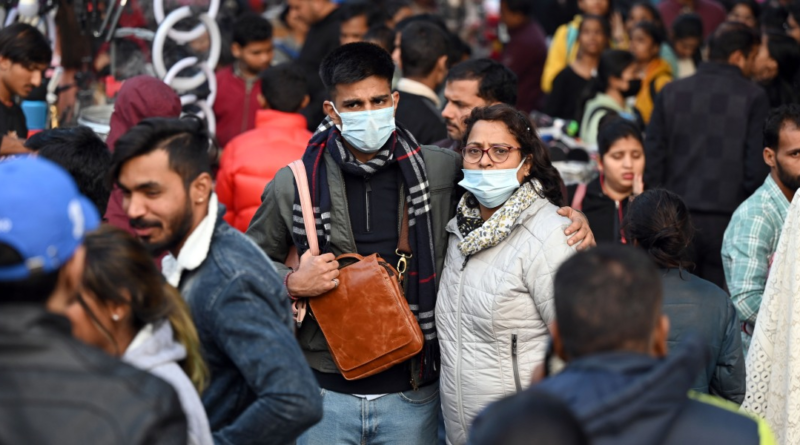The ‘Gryphon’ family of COVID variants is off the leash and spreading globally—but their bark may be a lot worse than their bite
You may remember the XBB variant that took Singapore by storm last fall—one of the most immune-evasive yet. Dubbed “Gryphon” by the Canadian biology professor Ryan Gregory—who has a lot more names like it for other variants—after the mythical amalgamation of eagle and lion, it’s less of a global player than it was then. Now its descendants are battling for dominance throughout the world. Experts are keeping a close eye in particular on (the also Gregory-monikered) “Kraken” XBB.1.5, due to its ability to grow at a breakneck pace.
A recent report out of India offers some comfort, however. Of 85 patients with XBB variants surveyed in Maharashtra, India, during the later half of 2022, most (88%) were symptomatic, but the majority of them (79%) were able to cope with infection at home, versus in a hospital. The study (which has not yet been peer reviewed) also had good news about survival and symptoms.
The vast majority of the patients (96%) survived, with only three deaths among the group, according to the study, published Jan. 6 on Yale University-affiliated preprint repository medRxiv.
Fever was the most common symptom among the group, with nearly three-quarters of XBB-variant patients experiencing it. Runny nose, cough, sore throat, muscle pain, and fatigue/weakness were the second, third, fourth, and fifth most common, respectively. No XBB-variant patients experienced chest pain or skin rash. And only a handful experienced shortness of breath, loss of taste or smell, or GI symptoms such as diarrhea or vomiting.
XBB COVID variants are causing “mild disease in India,” the authors wrote, referring to the XBB variant itself, as well as offspring variants like XBB.1, XBB.2, XBB.3, and XBB.5.
Authors of the study warned, however, that the variant has the potential to spread around the world rapidly, given mutations that allow it to escape immunity from prior infection and vaccination, and infect others more effectively.
Symptoms were fairly similar among all COVID patients interviewed, including those with BA.2-family, BA.5-family, and BQ.1 variants. Patients with BA.2.38, BA.2.75, and XBB-family variants, however, tended to experience headache and breathlessness at a greater rate.
The vast majority—around 90%—of the study’s participants were vaccinated, including XBB-family patients. Most XBB patients (76%) had received two doses, and a little more than a fifth had been boosted. Only four were unvaccinated. Study participants’ high rate of vaccination may have contributed to the generally mild presentation of XBB variants, the authors cautioned.
XBB is a recombinant, or combination, of two BA.2 variants: BA.2.75 and BA.2.10.1, according to the World Health Organization. The variant was first discovered in August and made headlines when it spiked in Singapore in this fall, though the country’s minister of health noted that it seemed to carry a roughly 30% lower risk of hospitalization when compared to BA.5. Eventually XBB also became dominant in India, Bangladesh, Malaysia, and other parts of Asia.
XBB spinoff XBB.1.5, dubbed “Kraken,” was behind 18% of U.S. COVID last week, the Centers for Disease Control and Prevention (CDC) said Friday. It’s projected to fuel 28% of cases this week, making it the second most common variant in the U.S.—and putting it on track to become the most dominant in the States, according to a Jan. 5 memo from the European Centre for Disease Prevention and Control (ECDC).
Experts are keeping a close eye on it due to its rapid growth rate. It is estimated to double the number of those it sickens every nine days, according to the CDC’s European counterpart.
It’s unknown whether the variant is contributing to a rise in hospitalizations in the northeast U.S., where it’s thriving, WHO officials said last week. But experts told Fortune this week that Kraken is likely playing at least a part in the regional rise in hospitalizations—and that the rise could spread geographically, as case levels of the new variant trend upward in western states.
While it’s too early to say definitively, XBB.1.5 is not thought to cause more severe disease. The World Health Organization will continue to refer to it as Omicron and will not assign it a new Greek letter, officials said Wednesday, arguing it doesn’t differ enough from other Omicron variants to warrant one.
Editor’s note: This article was updated at 6:26 p.m. ET to include the correct variant nickname for XBB.
Learn how to navigate and strengthen trust in your business with The Trust Factor, a weekly newsletter examining what leaders need to succeed. Sign up here.



